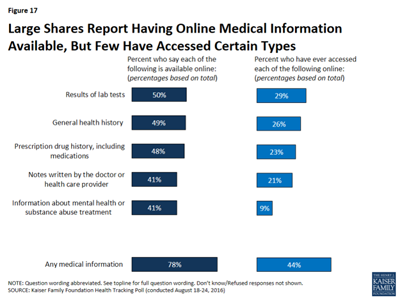 Most Americans say accessing their lab tests, health history, prescription drug lists, and doctors’ notes is important. But patients in the U.S. do not universally have access to their electronic health information, and nor do all those who can access their personal health information do so, according to the Kaiser Health Tracking Poll: August 2016 from the Kaiser Family Foundation (KFF).
Most Americans say accessing their lab tests, health history, prescription drug lists, and doctors’ notes is important. But patients in the U.S. do not universally have access to their electronic health information, and nor do all those who can access their personal health information do so, according to the Kaiser Health Tracking Poll: August 2016 from the Kaiser Family Foundation (KFF).
In yesterday’s Health Populi blog, I focused on the Poll’s political findings — that Hillary Clinton is perceived by more American voters than Donald Trump to be trusted on health care issues. In today’s post, I’ll cover the poll’s findings on U.S. health consumers’ perceived value of and access to their personal health information as gleaned from KFF’s survey.

Overall, 78% of Americans have access to any kind of medical information online; just 44% of these people have accessed any of this information. The first bar chart illustrates the disconnect between people who have access to specific types of personal health information online, and those who have ever accessed that information: while roughly 50% of U.S. patients have access to online lab results, medical history, and prescription drug lists, at most one-quarter of folks have accessed this information online. It’s also surprising that while 41% of patients have access to information about mental health or substance abuse treatment, only 9% of people have accessed this information online.
80% of U.S. patients say it’s important for doctors to use electronic medical records (EMRs), shown in the second pie chart. The needle on peoples’ perceptions on the importance of EMRs hasn’t changed much since 2009, when 75% of people thought EMRs instead of paper records would be important for their physicians to use.
What has moved, significantly, is the proportion of consumers who see their doctors now use EMRs: in 2016, 80% of patients say their doctors enter health information into a computer; in 2009, only 46% said their doctors were using computers for their patient information input.
Medical information privacy continues to be a concern to about one-half of U.S. consumers, 30% of whom are “very concerned,” and 17%, “somewhat concerned.” 30% of consumers are not much concerned, with 22% of patients saying their records are not yet available online.
The Kaiser Family Foundation polled 1,211 U.S. voters between August 18-24, 2016, via phone.
Health Populi’s Hot Points: Among consumers with online access to their personal medical information, one-half of U.S. consumers said they do not need to access their health information online. This is the most surprising data point gleaned in the KFF Poll. Underneath this number are the following explanations:
- 49% said they did not have a need to access the information
- 15% did not have access to the internet
- 13% did not know how to access the information
- 11% were concerned about privacy or security
- 2% of people didn’t want to know what the doctor wrote down about the visit.
This begs the questions, for the 49%, what constitutes a “need” to access one’s personal health information? Is it a personal perception of whole health? Is it denial or avoidance of bad news or self-awareness? Is it a general lack of interest?
We don’t know the granular reasons for one-half of people avoiding online access to their own health information. We do know that health activation supports better outcomes, and lower health costs, based on the decades+ research of Judith Hibbard and team working with the Patient Activation Measure (PAM) which indexes consumers’ engagement in their own health.
It’s also important to “know your numbers” in order to manage what we can measure when it comes to blood pressure, cholesterol, weight, blood glucose, and other metrics.
The DIY health culture is growing, but has not nearly reached the last mile, or mainstream patient-consumer. Consumers are keen on Amazon (and Prime fast-delivery), OpenTable and Uber. Health data served up fast? Not so much, not yet, for mainstream health consumers, based on what KFF has learned.




 Interviewed live on BNN Bloomberg (Canada) on the market for GLP-1 drugs for weight loss and their impact on both the health care system and consumer goods and services -- notably, food, nutrition, retail health, gyms, and other sectors.
Interviewed live on BNN Bloomberg (Canada) on the market for GLP-1 drugs for weight loss and their impact on both the health care system and consumer goods and services -- notably, food, nutrition, retail health, gyms, and other sectors. Thank you, Feedspot, for
Thank you, Feedspot, for  As you may know, I have been splitting work- and living-time between the U.S. and the E.U., most recently living in and working from Brussels. In the month of September 2024, I'll be splitting time between London and other parts of the U.K., and Italy where I'll be working with clients on consumer health, self-care and home care focused on food-as-medicine, digital health, business and scenario planning for the future...
As you may know, I have been splitting work- and living-time between the U.S. and the E.U., most recently living in and working from Brussels. In the month of September 2024, I'll be splitting time between London and other parts of the U.K., and Italy where I'll be working with clients on consumer health, self-care and home care focused on food-as-medicine, digital health, business and scenario planning for the future...